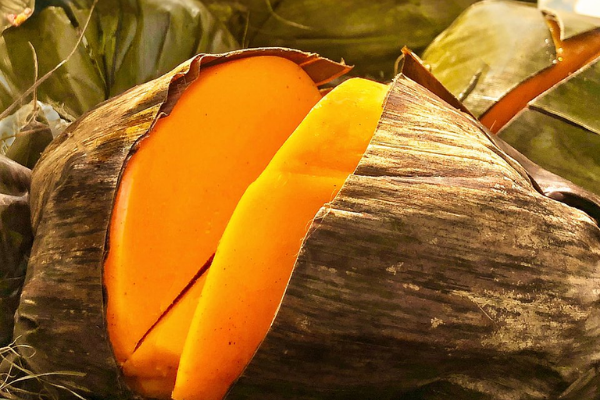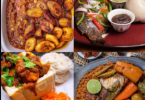Members of the bean family have been serving quality nutrition to many parts of Africa for centuries. A number of nutrient-rich bean recipes are now nationally and regionally known across Nigeria and West Africa. Tasty Yoruba meals such as Moin-moin and Ekuru (varieties of bean pudding), Akara (bean cakes), Gbegiri (blended bean stew) and Ewa-aganyin are classical examples. Tofu (soya cheese) and soya milk are exceptional. In this article, will dwell on another nutrient-dense legume from southeast Nigeria – namely Okpa.
Okpa recently made its way from its southeast origins, into the major markets and streets of Nigerian cities like Lagos and Abuja. Slowly but steadily, the rich food is becoming popular; and not just amongst Igbos who have tasted it before. Where did Okpa originate from? And for such a legume that deserves the honourable classification of superfood, why did it remain an obscure food for so long? In any case, let us investigate the history of Okpa; and why this food should not be taken for granted.
The Origins and Cultural Significance of Okpa in Southeast Nigeria
Okpa (also called Igba and Ntucha in some Igbo cultures) is a famous local dish relished by indigenes of Enugu (in southeast Nigeria) and its environs. Its fame is gradually spreading across Igboland. And now it is also gaining recognition, slowly and surely, in every town and city where the original consumers are now settled.
Okpa is made from a variety of beans called Bambara nuts (Vorandzeia subterranea). It is generally believed that bambara nuts was originally cultivated by pioneer farmers in Enugu state (though no one is certain of its origin). Beyond Enugu, the legume was also cultivated and eaten by the Igara tribe in Kogi state, and Ekpoto tribe of Benue state. The Hausa people who are also aware of this crop, refer to it as ‘Gurjiya’ or ‘Kwaruru’.
Okpa has a distinct taste that is very appealing and satisfying, as widely claimed by its consumers. It often does not require any seasoning; as such, its main ingredients are bambara nut flour, palm oil, salt, pepper, and native uziza leaves. If at all required, it just needs a small quantity of seasoning. It also has a waterier consistency than the moin-moin recipe of the Yoruba people. It is often prepared wrapped in plantain leaves, nylon, or some other suitable container or wrapper. It can be eaten at any time of the day. It may also be eaten with pap, or on its own.
Additionally, the tasty food is so well prepared by certain communities in Enugu state, that they have perfected a variety of tasty Okpa recipes. The best communities who have specialized in the art of cooking Okpa include Obollo, Ovoko-Agu, Nsukka, and Enugu Ezike. Of these, Ovoko-Agu community is reputed to be the top chefs in preparing Okpa recipes. Okpa is now accepted as part of Enugu (and Igbo) tradition. So much so that a major masquerade named ‘Ori Okpa’ (Okpa eater) is often featured during cultural festivals in Nsukka, Enugu state.
Nutritional Facts About Okpa – A Classical Superfood
Okpa or bambara nut is classified as a superfood. It is practically a complete meal in itself. The legume contains about 4.93 percent of fat; 26.62 percent of carbohydrate; and 16.92 percent of protein. It also contains an abundance of iron, phosphorus, calcium, magnesium, zinc, potassium, manganese, niacin, beta carotene, and fiber.
When its protein content gets hydrolyzed by enzymes, it produces peptides with antioxidant, antihypertensive, and anti-inflammatory properties. It can help in weight loss/control, detoxifying the body, prevention and treatment of anaemia, diabetes, high blood pressure and cardiovascular diseases.
Varieties of Okpa Recipes to Try
In the Ovoko-Agu community alone, there are up to ten different recipes/methods of preparing Okpa. They include the following:
Ekerete Okpa (the basic recipe): Made from dry ground bambara flour mixed with a good quantity of water. The other basic ingredients are palm oil, salt, pepper, and uziza leaves. When cooked in cans (or perhaps plastic containers), it is referred to as Mgbuiyi Okpa.
Apirapi (or Usukpata) Okpa: Rather than use dried ground Okpa flour, the bambara nuts could also be soaked and peeled before being ground. Then its basic ingredients can be added to form the same recipe as Ekerete or Mgbuiyi Okpa. This method makes the Okpa softer and tastier than the one prepared from dried groung Okpa flour.
Ikpakpa-akpoko: The mixture is that of the Mgbuiyi or Ekereke Okpa, but lacking oil. It is typically eaten with a specially made stew.
Utara Okpa: The dry ground bambara flour can be steamed and mixed in morsel form (in the manner of fufu or garri). It does not require oil. It can be eaten with a rich soup.
Owuna Okpa: This is dry ground bambara flour mixed with water and fried as bean cakes. It is typically formed into a disc shape.
Okpukpuru Okpa: This is the dry and coarse extract from ground bambara flour, prepared and fried in small rolls (much like a popsicle shape).
Ikputu Okpa: This is freshly harvested and cooked bambara nuts (just like boiled groundnuts).
Eyereye (or Aruraru) Okpa: These are simply bambara nuts roasted over dry heat – in the same manner of the common roasted groundnuts.








